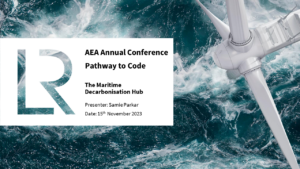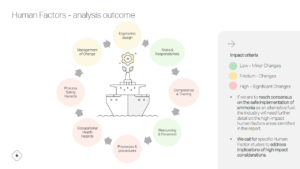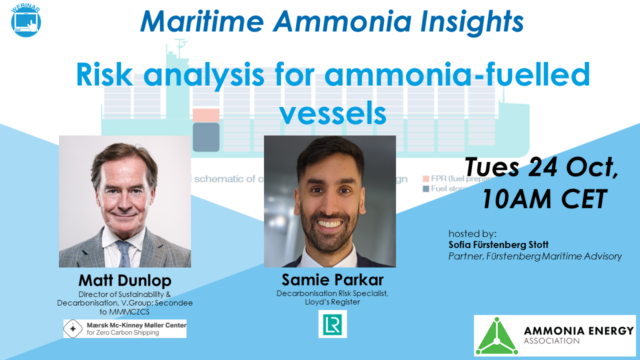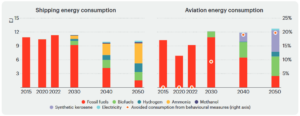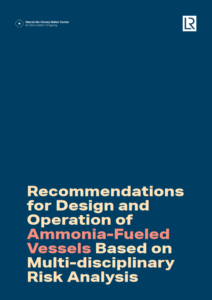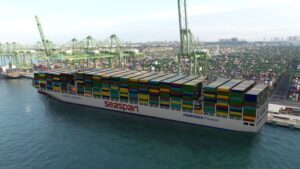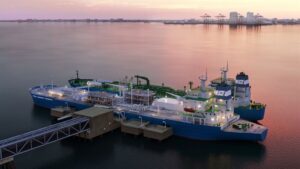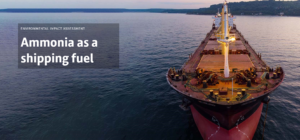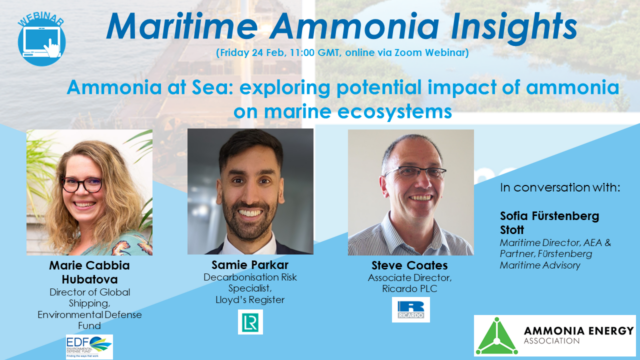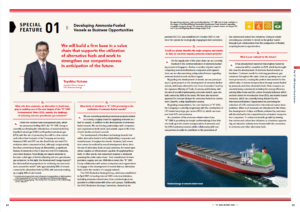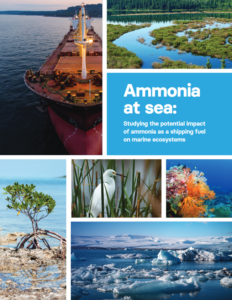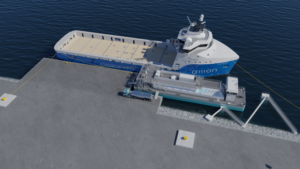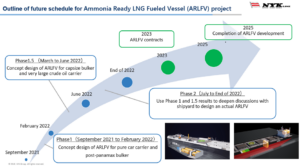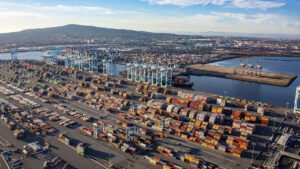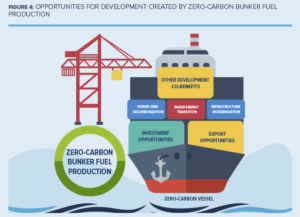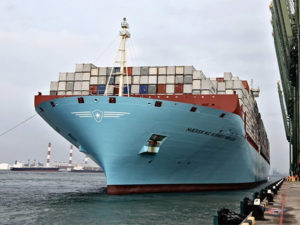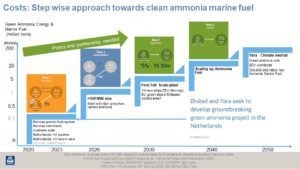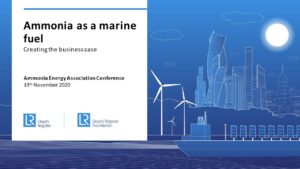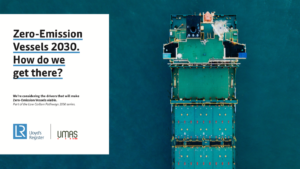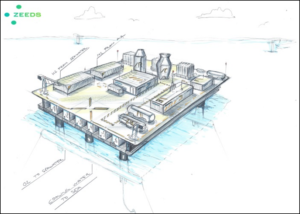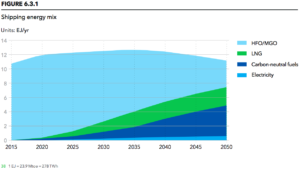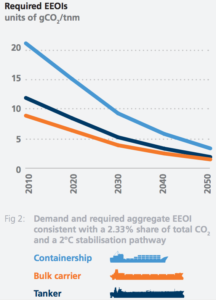Content Related to Lloyd's Register
We do it safely, or not at all: the marine ammonia fuel journey
In our latest episode of Maritime Ammonia Insights, Matt Dunlop (MMMZCS) and Samie Parkar (Lloyd’s Register’s) stepped us through key outcomes of a new, comprehensive safety study for ammonia-fuelled shipping. Combining Quantitative Risk Analysis with Human Factors analysis, a series of risk mitigation & worker training recommendations provides a path forward for the safe operations of ammonia-fuelled vessels.
Risk analysis for ammonia-fueled vessels
Hear from the authors of a new joint study into ammonia safety onboard ships. The study is the most comprehensive to-date on the effectiveness of risk mitigation measures applied to ammonia-fueled vessels, pairing Quantitative Risk Assessment with an analysis of human factors.
IEA: ammonia key to decarbonising shipping by 2050
With international shipping activity to more than double by 2050, the IEA forecasts that ammonia’s share of final energy consumption in the industry will rise to 44% in 2050, with a suite of other low-carbon fuels to play smaller roles. Lloyd’s Register & OCI HyFuels have also forecast that ammonia (and particularly electrolytic ammonia) will become the most significant fuel in the maritime sector by 2050.
A human factors approach to safety on ammonia-fueled vessels
A joint study into ammonia safety onboard three different vessel types has found that safety risks of ammonia fuel can be mitigated, but only if technical safeguards are implemented and key “human factors” are addressed. The new report sets out a series of recommendations to ensure acceptable risk levels for crew on-board ammonia-fueled vessels.
Cracking-based propulsion systems, new vessels on order
Norwegian technology developer Pherousa announced that it has developed & validated an ammonia cracking-based propulsion system, with plans to order six Ultramax vessels fitted with the technology. Grieg Maritime has ordered up to four ammonia-ready bulk carriers from China State Shipbuilding Corporation for delivery in 2026. And a new container ship design has been unveiled by the Mærsk Mc-Kinney Møller Center for Zero Carbon Shipping.
Maritime developments: on-water cracking, AiPs and Singapore bunker study releases first results
In maritime ammonia updates this week:
- In Europe, government funding will support the development of an ammonia cracking system that can be installed on existing LNG vessels (Norway), and the establishment of a floating production and storage facility connected to an offshore wind farm (Netherlands).
- Two AiPs have been granted: one for Korea’s first ammonia FSRU vessel, the other for a bunkering tanker in Singapore.
- H2Carrier and Trelleborg will develop a ship-to-ship ammonia transfer system.
- And GCMD has unveiled the results of their Singaporean ammonia bunker study. All risks identified for conducting pilot projects were found to be low or mitigable, with work towards those pilots to continue.
Quantifying the environmental impacts of ammonia at sea
In our latest episode of Maritime Ammonia Insights, we explored the findings of a new, landmark environmental study: Ammonia at Sea. Speakers representing the report’s co-authors joined us to discuss the results, what further work is required and how the report is being incorporated into policy discussions at the IMO.
Ammonia at Sea: exploring the potential impact on marine ecosystems
Hear more from the authors of the Ammonia at Sea report: an analysis of everything currently known about ammonia’s behaviour in the aquatic environment, plus the potential impacts of the use of ammonia as a marine fuel.
Maritime ammonia developments in South Korea, Japan
In this week’s maritime ammonia news:
- Hyundai Heavy Industries, Lloyd’s Register and Korea National Oil Corporation have signed a new agreement to jointly develop an ammonia floating storage and regasification unit, or FSRU.
- KSS Line and Samsung C&T will cooperate to establish a clean hydrogen/ammonia transportation service, powered by alternative fuels.
- In Japan, K Line has announced ammonia will underpin its decarbonisation strategy to 2050, with AiP granted for a new Newcastlemax bulk carrier design.
- And the first of two CCU ammonia shipments have reached Ulsan from Saudi Arabia, with importer Lotte Fine Chemical leading development of a clean ammonia supply chain in the Yellow Sea.
New report released on environmental hazards of ammonia spills
Ricardo, Lloyd’s Register and the Environmental Defense Fund have used extensive modeling to assess the environmental impacts of large-scale ammonia spills in a variety of maritime scenarios. The study concludes that large-scale spills will have a high impact on certain environmental settings, and in particular fish species. The report also indicates that ammonia is less likely to spread & persist in the environment compared to a spill of conventional maritime fuel, and in some cases will pose less of a threat to certain species. More considerations need to be worked through, including health risks to a ship’s crew.
Amon Maritime unveils ammonia-powered, offshore platform supply vessel
Amon Maritime has launched a new subsidiary - Amon Offshore - which will build, own and operate a fleet of ammonia-powered platform supply vessels, to operate off Norway’s coast. The new PSV design has already received AiP for ammonia notation from DNV, and preliminary flag approval from Norwegian Maritime Authorities. We also explore two more AiP for ammonia-powered vessels in China: a 16,000 TEU container ship and a 50,000 tonne, mid-range oil/chemical tanker.
Signing up for Green Maritime Corridors
In the few short weeks since we explored the concept & implementation of “Green Maritime Corridors” at Ammonia Energy, we’ve seen a flurry of significant players express their interest in the space. Here we explore announcements from the Castor Initiative, the European Green Corridors Network, and the news that Singapore will become a signatory to the Clydebank Declaration for Green Shipping Corridors.
Ammonia vessel updates: the Castor Initiative, MS Green Ammonia & post-Panamax bulkers
Five ammonia vessel updates this week:
1. An ammonia/liquefied CO2 carrier concept design from Mitsui O.S.K. Lines & Mitsubishi Heavy Industries.
2. Approval in Principle for an ammonia-fueled car carrier designed by China State Shipbuilding.
3. Approval in Principle for the MS Green Ammonia.
4. An MoU between three members of the Castor Initiative to design & construct two Very Large Crude Carriers.
5. A concept design for up to four types of ammonia-ready, LNG-fueled vessels (ARLFV) from NYK Line.
Green Maritime Corridors - A catalyst for transition to green shipping fuels
The ports of Los Angeles and Shanghai have announced the intention to create a green shipping corridor across the Pacific Ocean. The ambition is for ships trading between these ports to run on alternative low greenhouse gas emission fuels. Ammonia stands among the options as such an alternative.
There is a clear willingness from key players at the LA end of this trans-Pacific shipping corridor to embrace alternative fuel solutions and work together to unlock a suite of zero emissions technologies, albeit limited to an onshore focus for now. Shifting focus onto the water - where ammonia maritime fuel will undoubtedly play a critical role - is the logical next step.
The Ammonia Wrap: a roadmap for ammonia-fueled gas turbines in Asia and more
This week: a roadmap for ammonia-fueled gas turbines in Asia, ammonia solutions in Iceland, IMO sets new decarbonisation milestone, new ammonia-powered vessels planned, maritime study developments, Australian updates (Fortescue, AREH and Itochu in Gladstone), Fertiglobe joins Abu Dhabi blue ammonia project and Statkraft's Porsgrunn plans.
The Ammonia Wrap: World Bank boosts hydrogen and ammonia as future fuels, new coalition for bunker ammonia, and cracking at the Wilhelmshaven hydrogen hub
Welcome to the Ammonia Wrap: a summary of all the latest announcements, news items and publications about ammonia energy. This week: the World Bank sees hydrogen and ammonia as key to decarbonising shipping, a new coalition for safe ammonia bunkering, Trafigura co-sponsors MAN's development of ammonia-fueled maritime engines, cracking plant a feature of the new Wilhelmshaven hydrogen hub, RWE and H2U to develop global hydrogen trading between Australia and Germany, Province Resources' West Australian mega-project grows to 8GW and South Africa's Hydrogen Society Roadmap a step closer.
Ammonia Energy Live March 2021: event wrap
Last week we presented the second episode in our monthly webinar series: Ammonia Energy Live. Every month we’ll explore the wonderful world of ammonia energy and the role it will play in global decarbonisation - with an Australian twist. This episode we welcomed Sammy Van Den Broeck, VP Project & Portfolio at Yara Clean Ammonia. Sammy was invited to give his thoughts on the key challenges and opportunities in the global ammonia transition, and explain to us why Australia is so important to Yara's future clean ammonia plans. Interviewing Sammy were Jacinta Bakker (Research Fellow in the MacFarlane Laboratory at Monash University) and Allison Gwilt (Senior Project Engineer, Future Fuels at Origin Energy).
The Ammonia Wrap: Japan developments, ammonia from wastewater, Fortescue's new carbon-neutral goal, project updates from Australia and H2Pro
Welcome to the Ammonia Wrap: a summary of all the latest announcements, news items and publications about ammonia energy. This week: new Japanese developments, new AiP for ammonia-fueled vessel, Singapore bunkering study, new ammonia from wastewater initiative, Fortescue brings carbon neutrality goals forward to 2030, Australian project updates for Hazer and H2U, and H2Pro updates from Israel.
Singapore Emerges as a Maritime Ammonia Center
Two recent announcements show Singapore emerging as a center for development of ammonia as a maritime fuel. In both cases, multi-party coalitions, with Singaporean connections, are focusing on ground-breaking work.
The Ammonia Wrap: EU ambitions, new tankers, and GW scale green ammonia in Denmark, Norway, and Chile
Welcome to the Ammonia Wrap: a summary of all the latest announcements, news items and publications about ammonia energy. In this week's wrap: HyDeal Ambition, new marine tankers, fuel forecasts & SOFC developments, a new technical briefing on power generation, UNSW leads research in P2X, GWs of green ammonia in Denmark, Norway and Chile, green ammonia in the Orkneys, new government focus on ammonia in South Africa, and India to make green ammonia production mandatory?
Marine Ammonia: panel wrap-up from the 2020 Ammonia Energy Conference
What action is needed to unlock the enormous potential of green ammonia as a marine fuel and get the new generation of ammonia-powered vessels on the water? On November 18, 2020, the Ammonia Energy Association (AEA) hosted a panel discussion moderated by Sofia Fürstenberg Stott from Fürstenberg Maritime Advisory, as well as panel members Tue Johannessen from the Center for Zero Carbon Shipping, Katharine Palmer from Lloyd’s Register, Rob Stevens from Yara International, and Kazumasa Taruishi from NYK Energy Transport.
Ammonia as a fuel – building the business case
Lloyd’s Register: how ammonia can be the ideal renewable marine fuel
We've recently reported a series of ammonia-fueled vessel development and demonstration projects led by industry consortia. One of these, in which Lloyd's Register is joined by Samsung Heavy Industries, MISC, and MAN Energy Solutions, is developing "an ammonia-fuelled tanker." In an interview with Ship Technology magazine this month, Lloyd's Register provided some new details about this project and added context for their ammonia-fueled vessel development plans.
MAN ammonia engine update
In November 2019, MAN ES published a technical paper describing the design and performance of its two-stroke green-ammonia engine. The paper also quietly announces the intentions of MAN ES to exploit ammonia energy technologies in a new business case, Power-to-X (PtX, "the carbon-neutral energy storage and sector coupling technology of the future"). In other words, MAN is moving into green ammonia fuel production.
Ammonia-fueled ships: entering the design phase
Three separate projects to design a range of ammonia-fueled vessels were announced last week at a shipping industry conference in China. Lloyd's Register has granted Approval in Principle (AiP) for the design of a 180,000 ton bulk carrier. ABS announced a project to "produce designs for an ammonia-fueled Chittagongmax container carrier of 2700 TEU capacity." And Lloyd's Register also announced a project for "an ammonia-fuelled 23,000 TEU Ultra-Large Container Ship (ULCS) concept design." All three projects are working with the two-stroke ammonia engine developed by MAN Energy Solutions, and all are led by major shipbuilders in China.
Ammonia – Could it replace HFO/LSFO?
The maritime sector's ammonia learning curve: moving from scenario analysis to product development
ANNUAL REVIEW 2019: The maritime industry is learning about ammonia fast. It is searching for a new bunker fuel, and ammonia is one of the few options that can realistically deliver a 50% reduction in the sector's GHG emissions by 2050. The IMO declared this target in April 2018 and, in last year's Annual Review, I wrote about all the reports that were published demonstrating that ammonia could deliver this outcome. In the last 12 months, by contrast, we have moved quickly beyond analysis and into engineering design, technology testing, and product development.
Maritime Industry Targets Ammonia Fuel to Decarbonize Shipping
In the last 12 months ... The International Maritime Organization issued its Initial GHG Strategy, committing the global shipping industry to emission reductions that cannot be achieved with carbon-based fuels. This single action is the regulatory trigger that unleashes a three-decade transition to carbon-free liquid fuels like ammonia. The target date for this 50% reduction in emissions is 2050 but, given the long economic life of ocean vessels, the transition must begin immediately.
Bunker Ammonia: new report quantifies ammonia as "the most competitive" fuel for zero-emission maritime vessels in 2030
This week, Lloyd's Register published the most significant comparative assessment so far of ammonia's potential as a zero-emission maritime fuel. The new report compares ammonia, used in either internal combustion engines (ICE) or fuel cells, to other low-carbon technologies, including hydrogen, batteries, and biofuels, estimating costs for 2030. It concludes that, of all the sustainable, available options, ammonia "appears the most competitive."
Bunker Ammonia: carbon-free liquid fuel for ships
The shipping industry is beginning to evaluate ammonia as a potential "bunker fuel," a carbon-free alternative to the heavy fuel oil (HFO) used in maritime transport. International trade associations are leading the effort to decarbonize the sector, in alignment with targets set by the Paris Climate Agreement. Their immediate challenge is simple to state but hard to solve: "ambitious CO2 reduction objectives will only be achievable with alternative marine fuels which do not yet exist." In the long-term, however researchers recognize that "fuel cell-powered ships are likely to dominate, drawing their energy from fuels such as hydrogen and ammonia."
